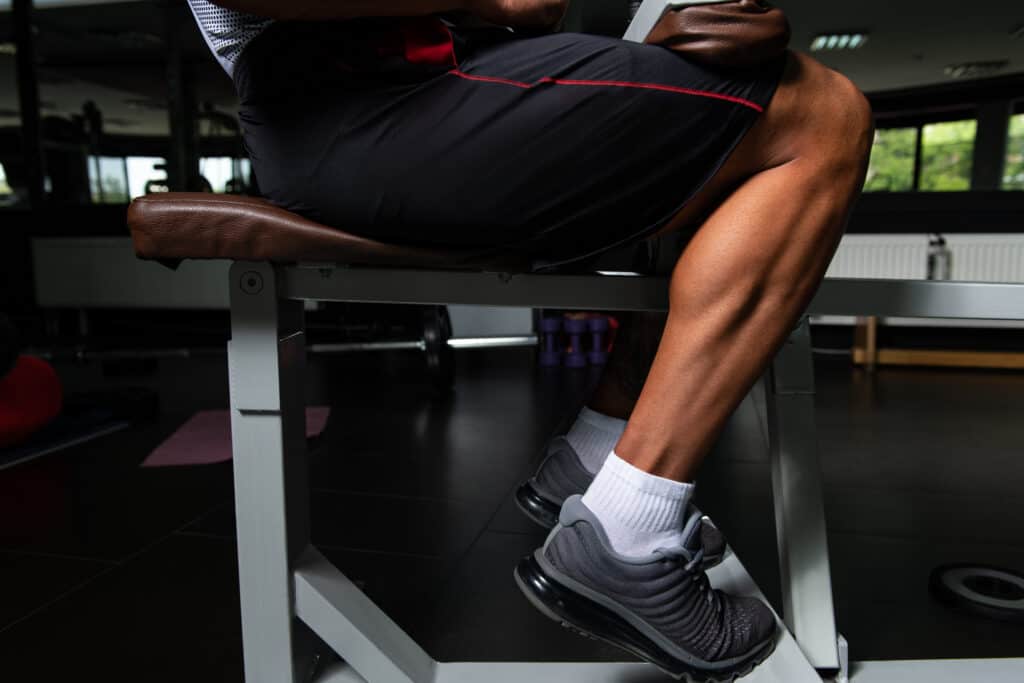Many would agree that one of the toughest areas to develop is the lower leg or the calves. The muscles in the front of the lower leg perform dorsiflexion. This occurs when you try to pull your toes and front foot off the floor. Conversely, pointing your toes or performing a heel raise is known as plantar flexion. This posterior lower leg is the area that we will focus on in this article.
There are other muscles involved but the main muscles used for plantar flexion are the soleus and gastrocnemius, commonly known as the calf muscle. The gastrocnemius does most of the work though. On a side note, the soleus muscle is actually bigger in terms of taking up surface space. It is hidden beneath the gastrocnemius so we don’t give it a lot of attention. These muscles are commonly referred to as the triceps surae.
Building Strong Calves
It is important to work the muscles of the lower leg from both standing and seated positions. While standing, the two heads of the gastrocnemius are targeted. This is also the muscle you see when you look down at the back of your lower leg. When seated, the knees and hips are at 90-degrees, and therefore the soleus gets targeted.
Latest Research
The soleus muscle is predominantly a slow-twitch fiber muscle. While the gastrocnemius has a combination of slow and fast-twitch fiber types. A study published in 2020 looked at the trainability of both of these muscle groups. It has often been thought that each area gets trained slightly different, in terms of repetitions, because of those fiber types. Results of the study, however, showed that changes in muscle thickness were similar for the soleus and the gastrocnemius regardless of the magnitude of load used in training.
Jefit Lower Leg Exercises
Barbell Exercises
Standing Calf Raise
Barbell Seated Calf Raise
Dumbbell Exercises
Dumbbell Standing Calf Raise
Seated Single-Leg Calf Raise
Calf Raise on Dumbbell
Machine Exercises
Seated Calf Raise
Calf Raise on Leg Press
Standing Calf Raise
Machine Calf Raise
Smith Machine Reverse Calf Raise
Hack Calf Raise
Reference
Shoenfeld, B., et al. (2020). Do the anatomical and physiological properties of a muscle determine its adaptive response to different loading protocols? Physiol. Rep. 8(9). doi: 10.14814/phy2.14427.
Stay Strong Together
Jefit, named best strength training app by Sports Illustrated, Esquire, GQ, Men’s Health, Greatest, Forbes Health, and many others. We offer a community responsible for 92,000,000 workouts to date! The app, which recently passed 10 million downloads, comes equipped with a customizable workout planner and training log. The app also has ability to track data, offer audio coaching cues, and can share workouts with friends. Visit our members-only Facebook group. Connect with like-minded people, share tips, and advice to help get closer to reaching your fitness goals.
Read the scientific paper published in the Journal of Medical Internet Research using the Jefit app. Also, a great Jefit app review was recently published by MUO that can be found here.
- Boost Your Posterior Strength with 3 Effective Jefit Exercises - March 31, 2025
- 8 Underrated Stretches to Improve Your Deadlift Performance - March 28, 2025
- Strength vs. Hypertrophy: Best Way to Train for Your Goals - March 26, 2025
